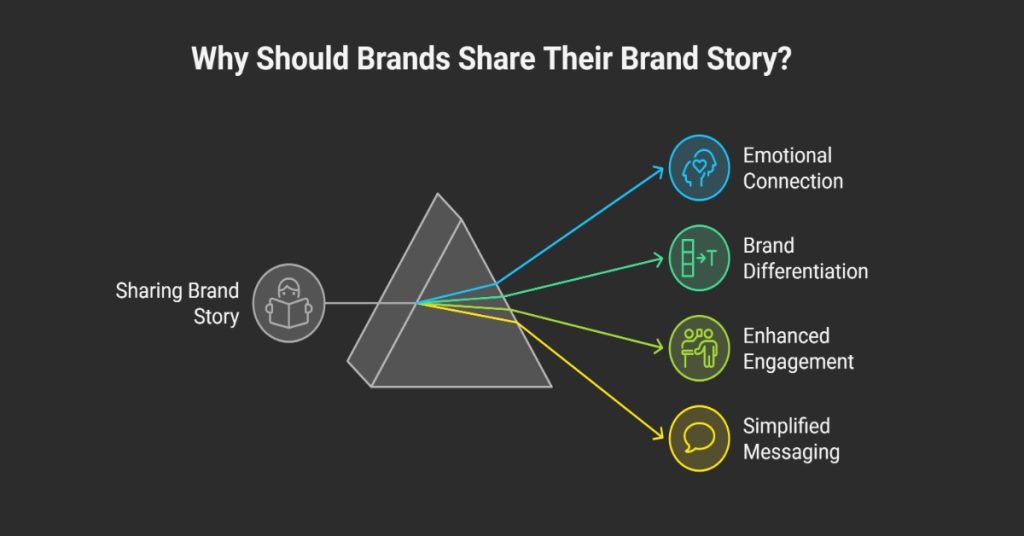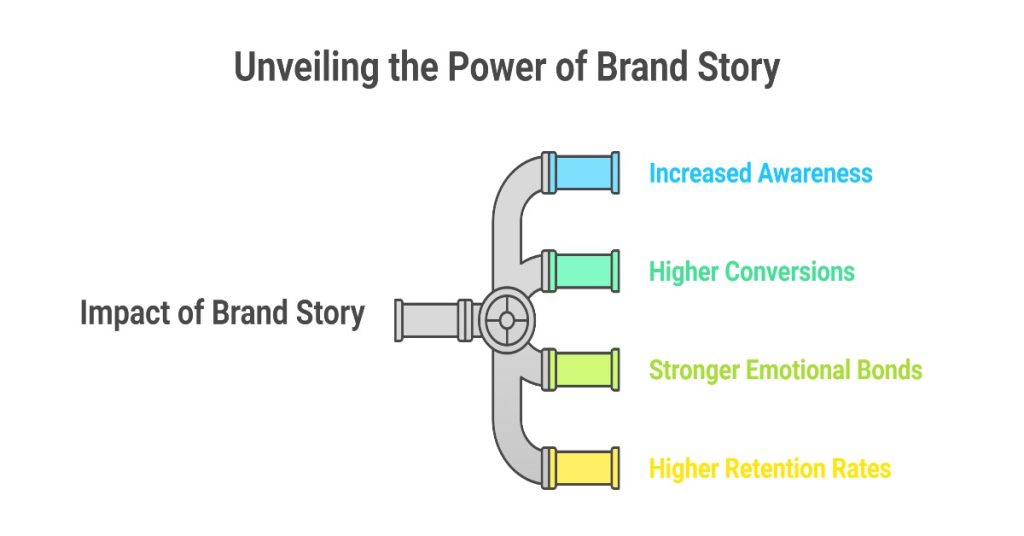The Power of a Brand Story: Connecting, Engaging & Inspiring
Brand story is a vital part of any brand as it states the reason behind its existence. It communicates the journey of the brand from the beginning, before its inception till today, explaining what they are doing to achieve their goals and missions.
Marketing is now all about sharing your unique story with others. It helps in standing out from the competitors as no one can snatch the story of “YOU”. The way you craft stories and narratives compel the customers to connect with the brand. In the long term, this helps in fetching conversions and adding a positive shift to the overall brand.
Table of Contents
- Why Should Brands Share Their Brand Story?
- Impact of Brand Story
- Conclusion
- Frequently Asked Questions (FAQs)
Why Should Brands Share Their Brand Story?
Every business has their own unique story of why they started and what they want to achieve. Their mission, their goals and values make them different from others. Their story holds immense potential of being a connecting link between the brand and their customers. Since stories are what humans are able to retain and connect with, brands should share and promote their own story as much as they can.
Humans are emotional beings at the end of the day. If brands can connect emotionally with their audience, it would help them create their own community of loyal customers. The end goal of any brand is to convert their customers into their loyal customers and brand advocates. Wait, too many jargons at once. Let me simplify it for you.
Falling in Love with Brand Story
Every brand wants customers to repeat their purchases with their brand for stable revenue. These customers, which buy repeatedly from one brand, are loyal customers. Brand advocates are people who defend any negative comments against their brand and would encourage people in their social circle to try their loved brand as well. Without any incentive, they will promote the brand to others for free. But why?
Because they have become attached to their loved brand and they have attached a part of their identity with it. But how? Maybe the brand story, its values, beliefs, goals or mission; one of these or all of these resonated with this loyal customer. They could relate themselves with the brand which made them attached to it. They are emotionally connected with the brand.

This is the reason why sharing your brand story is important as it can evoke certain emotions in humans. And we humans tend to remember emotions more than anything. But only the story is not enough. The story should be real and authentic, which demonstrates the challenges you overcome to keep their most loved brand alive. Why?
Because sharing your authentic journey, along with the struggles and challenges makes your story original and relatable. No one would be interested in a dull or boring story which has nothing to offer. The story holds value only if you are able to evoke an emotion in the reader’s mind and that is through drama. This is the reason why Hindi TV serials are still watched by many. Cause there is this drama element into it, which holds the attention of the viewers, no matter how lame the TV serial is.
Let’s summarize the points in bullet points for an easy read.
1. Emotional Connection
Sharing the brand story helps build trust and loyalty with your audience. It gives the audience something deeper to connect with and relate with the brand.
Data: 65% of consumers say they feel a stronger connection to brands that evoke positive emotions, and 60% of buyers prefer to buy from brands with a relatable emotional connection. (Source: Zipdo)
2. Brand Differentiation
Your story is unique and will be unique for every brand. Brand story is one asset, no one can steal it from you. It is yours and will be yours, so take advantage of your uniqueness to stand apart from your competitors.
3. Enhanced Engagement
Stories evoking emotions can compel people to share it with others to show their approval of the story or to inspire someone who might be struggling with the same challenge. There could be multiple reasons behind sharing a story with others. Yes, sharing stories with others does increase engagement, also increasing the chances of reaching new audiences.
Data: Brands using strategic storytelling see average engagement increases of 23%. (Source: Digital Marketing Institute)
4. Simplified Messaging
Communicating with others in simple language makes it easy for others to understand you. This point is especially important for B2B brands. Brand stories can help simplify their mission and goals for their target audience.

Impact of Brand Story
There are mostly positive impacts of sharing a brand story. Stories make a brand more memorable than other brands, which haven’t shared their story. Stories stay in our memories somehow, making it easy to imprint the name of a brand in the minds of the audience.
The benefits of sharing brand stories are obvious but still, let’s take a look at the bullet points.
1. Increased Awareness
A relatable and emotional brand story boosts brand visibility. People are more likely to share such stories with others, either digitally or IRL (in real life). This kind of word of mouth increases the reach and awareness of a brand. It can also in turn lead to higher brand recognition.
2. Higher Conversions
Stories can drive actions on sites like purchases or sign-ups. Yes, if someone falls in love with your story, they might be compelled to check out your website or the product. They might not visit you with the purpose of buying. But they will most likely check you out to judge and observe. Since it is a digital world, they are most likely to search for you on all platforms; but first and foremost, starting from social media.
They will most likely go through your social accounts and see how you are performing there and then they might sign up or follow you for any future updates. This is one type of customer journey we are seeing the most nowadays. With this, brands gradually build and attract their own network of customers.
Data: 15% of consumers will make an immediate purchase if they genuinely love a brand’s story. (Source: Leapmesh)
3. Stronger Emotional Bonds
Storytelling fosters deeper emotional connections, making your brand more trustworthy. Brand story sows a seed in the hearts of the audience which, if nurtured properly, can grow into a strong emotional bond with the brand.
4. Higher Retention Rates
Engaging stories keep viewers interested and hold their attention for longer periods of time. This is what brands want; they want to hold attention for as long as possible. The more people engage with a brand story, the higher the chances that they will remember and retain that brand for longer periods of time.

Conclusion
We hope you have learned that establishing your brand story is an important component of promoting your brand. This is the most impactful strategy, and most brands are adopting it since the new customers crave for emotional bonds and new experiences.
In fact, we can help you to bring your brand story to life in a way that drives connection and builds lasting relationships. Turn your vision into a story worth sharing. Head to our contact page, now!
Read More
What are the Psychological Tactics Behind Scroll-Stopping Videos?
10 New Trends in Video Production to Look Out for in 2025
B-Roll: What is it & How to Use it Effectively in Videos?
Frequently Asked Questions (FAQs)
Q1- What is a brand story?
A1- A brand story conveys the essence of your brand, its purpose, mission, values, and journey. It helps customers emotionally connect with your brand. It can shape how people perceive your company and foster long-term loyalty.
Q2- How do I write my brand story?
A2- To write your brand story, you can follow these steps:
- Define your purpose– Why do you exist, beyond making money?
- Identify your origin– Share how and why the brand was founded.
- Clarify your mission and values– What do you stand for?
- Know your audience– Tailor your story to resonate with your target audience’s needs and aspirations.
- Include conflict & triumph– Highlight real challenges and how you overcame them.
- Use a relatable tone– Keep it authentic, human & consistent with your brand voice.
Q3- How do you find your brand’s story?
A3- Finding your brand’s story starts with introspection. Ask yourself:
- What inspired the creation of this brand?
- Who are we here to help, and why?
- What challenges have we overcome?
- What values do we uphold, no matter what?
- How have we made a difference in the lives of customers or communities?
Talk to your team, founders, and even loyal customers to uncover the emotional core of your brand. Often, the most powerful stories come from the real moments.
Q4- How to start a brand story?
A4- Start your brand story by setting the scene:
- Introduce the problem or gap that existed before your brand came into being.
- Show what motivated the founders to take action.
- Then introduce the mission and how your brand began its journey to solve that problem.
A strong opening should engage your audience emotionally while clearly expressing your “why.” Remember, authenticity and relatability matter more than perfection.


